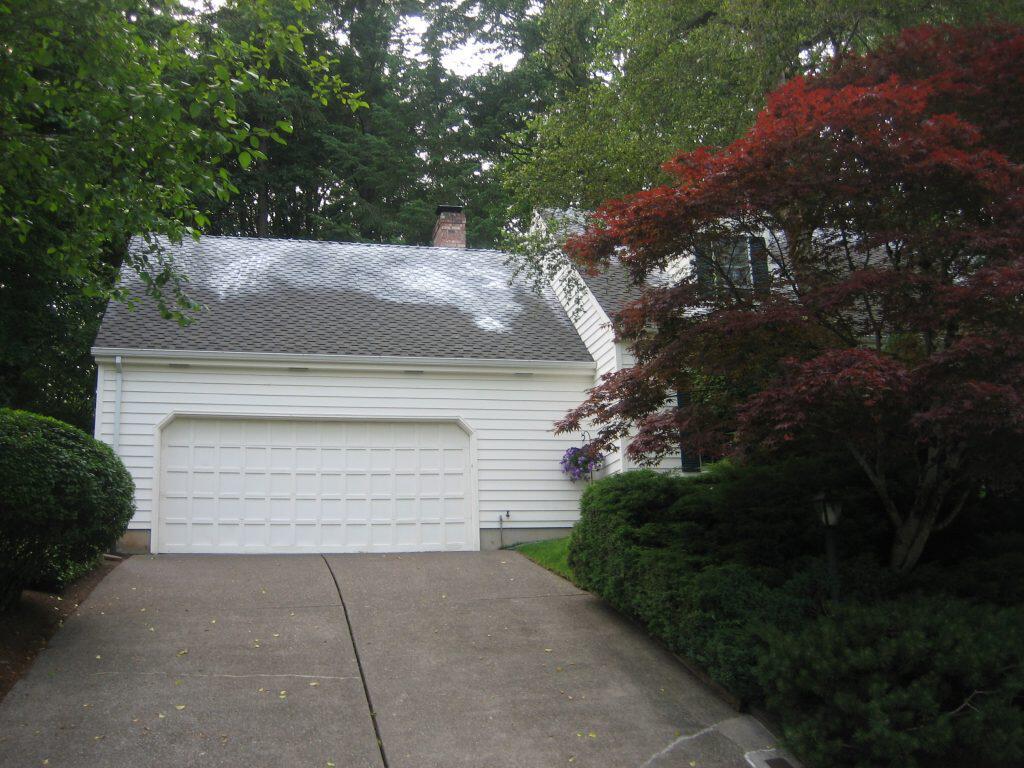
Key Takeaways
- Despite its known dangers, zinc sulfate has become a popular method of fighting moss growth on roofs due to its accessibility and low cost.
- Zinc sulfate is inherently corrosive, eating away at your roof and increasing the chances of a costly roof replacement or repair.
- Large levels of zinc sulfate can be toxic to humans and the surrounding ecosystem. Runoff can seep into the soil and damage wildlife.
- Due to rain and insufficient coverage, zinc sulfate leaves a powdery residue and uneven streaks on your roof.
- DIY roof tasks like applying zinc sulfate can lead to life-threatening falls from ladders or rooftops and should not be attempted.
Avoiding Zinc Sulfate Roof Treatments
Zinc sulfate is a popular treatment for roof moss removal, but many people don’t realize that it comes with several negative impacts. Understanding how zinc sulfate, or zinc monosulfate, can hinder the overall appearance of your home will help you choose a more practical alternative to getting moss and algae off of your roof. Additionally, learning about zinc sulfate and its effects will allow you to make responsible decisions for the betterment of your ecosystem and your health.
Relying on a team of roof care professionals is always smarter than performing DIY tasks. Before proceeding with zinc sulfate roof treatments, be sure to explore its potential health risks, like breathing complications and bodily irritations, and consider healthier, more effective options.
What Is Zinc Sulfate Used For?
In the home maintenance industry, zinc sulfate is used as an herbicide. It’s commonly applied to buildings in an attempt to control moss and algae growth on their roofs. Due to its inefficiency and dangers, many well-educated roof care professionals refrain from using this risky combination of sulfur and zinc. Unfortunately, zinc sulfate has grown in popularity in the DIY world due to its easy accessibility and affordability, causing some people to apply the substance annually.
Why is it Important to Control Roof Moss?
Moss growth can quickly get out of hand, especially in naturally humid places with mild winters, such as Portland, Oregon. In fact, Oregon State University declared moss as a high-level risk to your property and a considerable annoyance. The main reasons why moss is harmful to your roof are:
- Potential moisture build-up – Moss acts like a sponge, soaking up water and holding it in one place, which can lead to roofing material damage and leaks.
-
- Possible chances for rot – When moisture-filled moss sits on your roof too long, it can seep into the material and expedite decay.
- Compromises structural integrity – Heavy clumps of moisture-filled moss and potentially rotten roofing material can cause your roof to lose stability, increasing your chance of a cave-in.
Considering the risks associated with roof moss, it’s easy to understand why a homeowner would want to get rid of it. However, zinc sulfate is not the best route to remove moss, as it usually does not permanently kill roof moss and can hurt your home in other ways.
Get Rid of Stubborn Roof Moss
Our team can safely remove harmful roof moss and apply preventive treatments to keep your roof clean and protected year-round.
Negative Effects On Roofing Materials
When applied indiscriminately, zinc sulfate has the potential to damage your roof. Using zinc sulfate on your roof can have several negative and harmful effects.
Corrosion
Zinc sulfate can be corrosive when introduced to certain roofing materials. For example, zinc sulfate has the potential to react with the following roofing components:
-
- Asphalt shingles—Zinc sulfate’s corrosive properties can cause asphalt shingles to lose their protective granules.
- Gutters – Certain metals used to make gutters, like aluminum and steel can react with zinc sulfate powder and begin corroding.
- Downspouts – Runoff water that contains zinc sulfate can react with your downspout’s metal construction, fostering corrosion.
Acceleration of Metal Deterioration
In addition to gutters and downspouts, other metal features on your roof, such as flashing or vents, can also react with zinc sulfate. Once the metal begins to corrode, its deterioration accelerates, putting your house’s components at risk for water damage and increasing your chance of needing a roof repair.
Residue
Once applied to the roof, zinc sulfate powder can form streaks and leave an unsightly appearance. The following natural forces contribute to unsightly patterns of zinc sulfate residue:
- Rain – When washed down by rain, zinc sulfate can leave odd-looking strips of white powder atop your shingles.
- Wind – During heavy gusts of wind, zinc sulfate can scatter across your roof, leaving behind residue in certain areas.
Environmental Impact Of Zinc Sulfate
Although zinc organically occurs in the environment, zinc sulfate is an inorganic salt that poses various threats to the ecosystem when unregulated. According to the National Pesticide Information Center, zinc salts are slightly toxic to birds and highly toxic to fish and invertebrates. With this in mind, the Environmental Protection Agency (EPA) has placed Zinc Sulfate in Toxicity Category I.
Zinc sulfate roof treatments could spark the following consequences:
- Zinc sulfate runoff can enter your soil.
- Once in the soil, zinc can become soluble.
- Its solubility can allow zinc to enter nearby plants.
- Zinc can bind to proteins or organic acids in plants.
- In high concentrations, zinc can hinder the growth of plants and damage their cells.
- Animals could eat a plant that is overloaded with zinc and suffer from its toxicity.
Zinc sulfate can harm more than just moss. Talk to a roof care professional to find the best environmentally friendly alternative to zinc sulfate roof treatments to avoid disrupting the ecosystem in your area.
Zinc Sulfate Health Concerns
In addition to endangering plants and organisms near your home, zinc sulfate roof treatments can also pose threats to you and your well-being. Despite small amounts of zinc being a natural part of the human body, the National Pesticide Information Center lists the following symptoms as potential results of overexposure to zinc sulfate:
- Breathing in zinc sulfate can:
- Aggravate the respiratory tract
- Develop nausea
- Incite vomiting
- Generate a stomach ache
- Spur dizziness
- Encourage depression
- Cause death (in extreme situations)
- Skin exposure to zinc sulfate can:
- Damage the skin
- Lead to ulcers
- Generate blisters
- Create scarring
- Eye exposure to zinc sulfate can:
- Cause severe eye irritation
- Result in redness
- Generate pain
- Eating too much zinc sulfate can:
- Cause nausea
- Generate a metallic taste
- Start a stomach ache
- Incite vomiting
- Incur bloody diarrhea
In Pacific Northwest cities like Portland, Oregon, where moss is especially prevalent, the consequences of zinc sulfate treatments can be found more frequently. In 2021, the Oregon Department of Agriculture (ODA) had to investigate reported issues of residents experiencing breathing problems from supposed zinc sulfate roof treatments.
In July of 2021, ODA released a reminder that you must have a license to distribute such pesticides. So, it’s recommended that you turn to roof care professionals for moss abatement.
Alternatives To Zinc Sulfate
Thankfully, there are plenty of environmentally friendly ways to get rid of moss that are more effective than zinc sulfate. The most common eco-friendly methods to abate moss and algae growth are:
- Physical removal – Simply sweeping or using a leaf blower can remove some of the looser moss patches on your roof. Still, physical removals can be dangerous for DIY attempts due to the potential of falling from a ladder or rooftop.
- Routine roof maintenance – Keeping your roof properly ventilated, gutters cleared of debris, and overhanging branches trimmed to allow more sunlight to reach your roof are great ways to limit moss growth.
- Biodegradable moss treatments – Using natural ingredients with low toxicity like combinations of citric acid or fatty acids derived from plants, is a great way to attack moss without hurting other parts of the environment.
- Algae-resistant roofing materials – When it’s time to replace your roof, consider using algae-resistant shingles. These shingles contain additives that inhibit the growth of algae and sometimes moss, but they don’t produce the same dangerous runoff as zinc sulfate.
Roof care professionals are trained to remove moss and other forms of unwanted and invasive vegetation in the most humane way possible. Avoid using zinc sulfate, and contact a trusted roof care team for support with moss removal.
Take Care Of Moss The Right Way With Roof Life
Moss loves Portland, Oregon, because it’s naturally wet and humid. During the mild and moist winter months, all types of moss thrive, including lawn moss and rooftop moss. In Portland and the surrounding areas, it’s crucial to have professionals regularly inspect your roof and remove moss as necessary.
However, using zinc sulfate for moss removal is like replacing one problem with another. Large amounts of zinc sulfate can be dangerous to humans, nearby plants and animals, and the quality of your roof itself.
Roof Life of Oregon’s team of trained roofing professionals can help you treat and prevent rooftop moss without using toxic chemicals like zinc sulfate. Through consistent roof maintenance, physical removal, and biodegradable moss-removing alternatives, Roof Life of Oregon can keep your roof looking gorgeous and moss-free.
Call us today for a free inspection. We’ll perform a detailed check of your roof and provide you with a quote for moss removal or any other services you may need.

